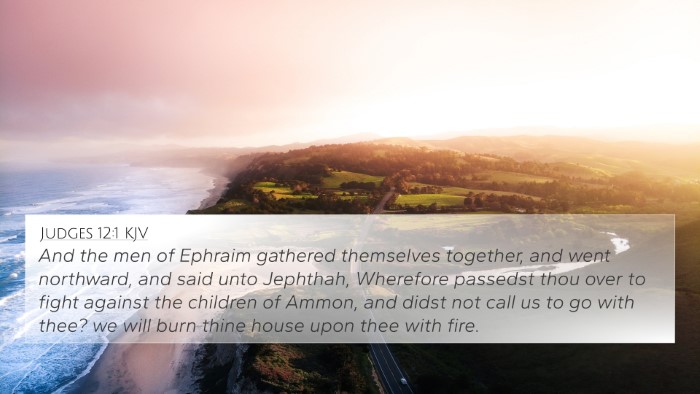Old Testament
Genesis Exodus Leviticus Numbers Deuteronomy Joshua Judges Ruth 1 Samuel 2 Samuel 1 Kings 2 Kings 1 Chronicles 2 Chronicles Ezra Nehemiah Esther Job Psalms Proverbs Ecclesiastes Song of Solomon Isaiah Jeremiah Lamentations Ezekiel Daniel Hosea Joel Amos Obadiah Jonah Micah Nahum Habakkuk Zephaniah Haggai Zechariah MalachiJudges 15:6 Similar Verses
Judges 15:6 Cross References
Then the Philistines said, Who hath done this? And they answered, Samson, the son in law of the Timnite, because he had taken his wife, and given her to his companion. And the Philistines came up, and burnt her and her father with fire.
Uncover the Rich Themes and Topics of This Bible Verse
Listed below are the Bible themes associated with Judges 15:6. We invite you to explore each theme to gain deeper insights into the Scriptures.
Judges 15:6 Cross Reference Verses
This section features a detailed cross-reference designed to enrich your understanding of the Scriptures. Below, you will find carefully selected verses that echo the themes and teachings related to Judges 15:6 KJV. Click on any image to explore detailed analyses of related Bible verses and uncover deeper theological insights.

Judges 14:15 (KJV) »
And it came to pass on the seventh day, that they said unto Samson's wife, Entice thy husband, that he may declare unto us the riddle, lest we burn thee and thy father's house with fire: have ye called us to take that we have? is it not so?

Judges 12:1 (KJV) »
And the men of Ephraim gathered themselves together, and went northward, and said unto Jephthah, Wherefore passedst thou over to fight against the children of Ammon, and didst not call us to go with thee? we will burn thine house upon thee with fire.

Proverbs 22:8 (KJV) »
He that soweth iniquity shall reap vanity: and the rod of his anger shall fail.

1 Thessalonians 4:6 (KJV) »
That no man go beyond and defraud his brother in any matter: because that the Lord is the avenger of all such, as we also have forewarned you and testified.
Judges 15:6 Verse Analysis and Similar Verses
Understanding Judges 15:6
Judges 15:6 states: "Then the Philistines said, 'Who has done this?' And they answered, 'Samson, the son-in-law of the Timnite, because he had taken his wife and given her to his companion.' So the Philistines came up and burned her and her father with fire."
This verse is pivotal in the narrative of Samson, showcasing the consequences of betrayal and the escalation of conflict between the Israelites and the Philistines. The verse highlights themes of revenge, loyalty, and the tragic outcomes of personal choices.
Contextual Analysis
The backdrop of Judges 15 involves ongoing strife between Samson and the Philistines, who ruled over Israel during this time. By marrying a Philistine woman, Samson entered a series of events leading to his conflict with the Philistines, ultimately leading to tragedy.
Commentary Insights
- Matthew Henry: Henry draws attention to the motif of betrayal. He notes that Samson's actions led not only to personal loss but also to broader implications for Israel’s struggle against its oppressors. The act of burning Samson's wife and her father illustrates extreme Philistine vengeance, reflecting their violent nature.
- Albert Barnes: Barnes emphasizes the chain reaction of violence sparked by personal grievances. He elaborates on the Philistines’ inquiry about who had wronged them, revealing their need for accountability before enacting retaliation. This indicates a structured brutalism in their societal approach to justice.
- Adam Clarke: Clarke highlights the emotional weight of the verse. He points out that the destruction of Samson's family showcases the collateral damage in the battle of national identities. The act against the family not only sought to punish Samson but served as a message to the Israelites of the Philistines' power.
Thematic Connections
This verse connects with several other biblical themes and books:
- Revenge and Retribution: The Philistines act out of a desire to avenge perceived wrongs, echoing themes found in Romans 12:19, "Vengeance is mine, I will repay, says the Lord."
- Consequences of Mixed Alliances: Samson’s marriage is a theme echoed in 2 Corinthians 6:14, which warns against being unequally yoked with non-believers.
- Personal Betrayal: The theme of betrayal corresponds with Psalm 55:12-14, reflecting on the pain caused by those close to us.
- Divine Justice: Links to the overarching motif of divine justice can be found in Proverbs 13:21, indicating that wrongdoing ultimately leads to consequences.
- Struggle for Identity: The theme of identity struggle resonates in Ephesians 6:12, which speaks to the spiritual warfare believers face.
- Judgment Against the Wicked: The reaction of the Philistines can be compared to Isaiah 59:18, where justice is served to the wicked.
- The Fall of Strong Men: Samson's narrative reflects the warning found in 1 Corinthians 10:12, "Let anyone who thinks that he stands take heed lest he fall."
Cross-References
The following list features cross-references that help elucidate the meaning and implications of Judges 15:6:
- Judges 14:16-20 - Details Samson's troubled marriage and foreshadows conflict.
- Judges 16:21 - Discusses Samson's eventual capture and punishment.
- Proverbs 24:17 - Advises against rejoicing over a friend's misfortune, connecting to the theme of loyalty.
- 2 Samuel 13:28-29 - Another instance of familial betrayal leading to violent outcomes.
- Matthew 10:36 - Jesus foretells that one's enemies will be those of their own household.
- Luke 12:51-53 - Jesus speaks to divisions even within families due to his teachings.
- Revelation 6:10 - The theme of justice for the wrongs endured correlates with the outcry of the martyrs.
Concluding Thoughts
Judges 15:6 serves as a poignant reminder of the consequences that arise from personal choices and conflicts. The narrative of Samson is one of tragedy not only for the individual but also for the community at large, signaling the ongoing struggle between Israel and Philistia.
For those engaging in cross-referencing Biblical texts, this verse provides rich ground for exploring patterns of vengeance, betrayal, and divine justice throughout scripture. Utilizing tools for Bible cross-referencing can greatly enhance understanding as one navigates the complex themes and narratives present in both the Old and New Testaments.


